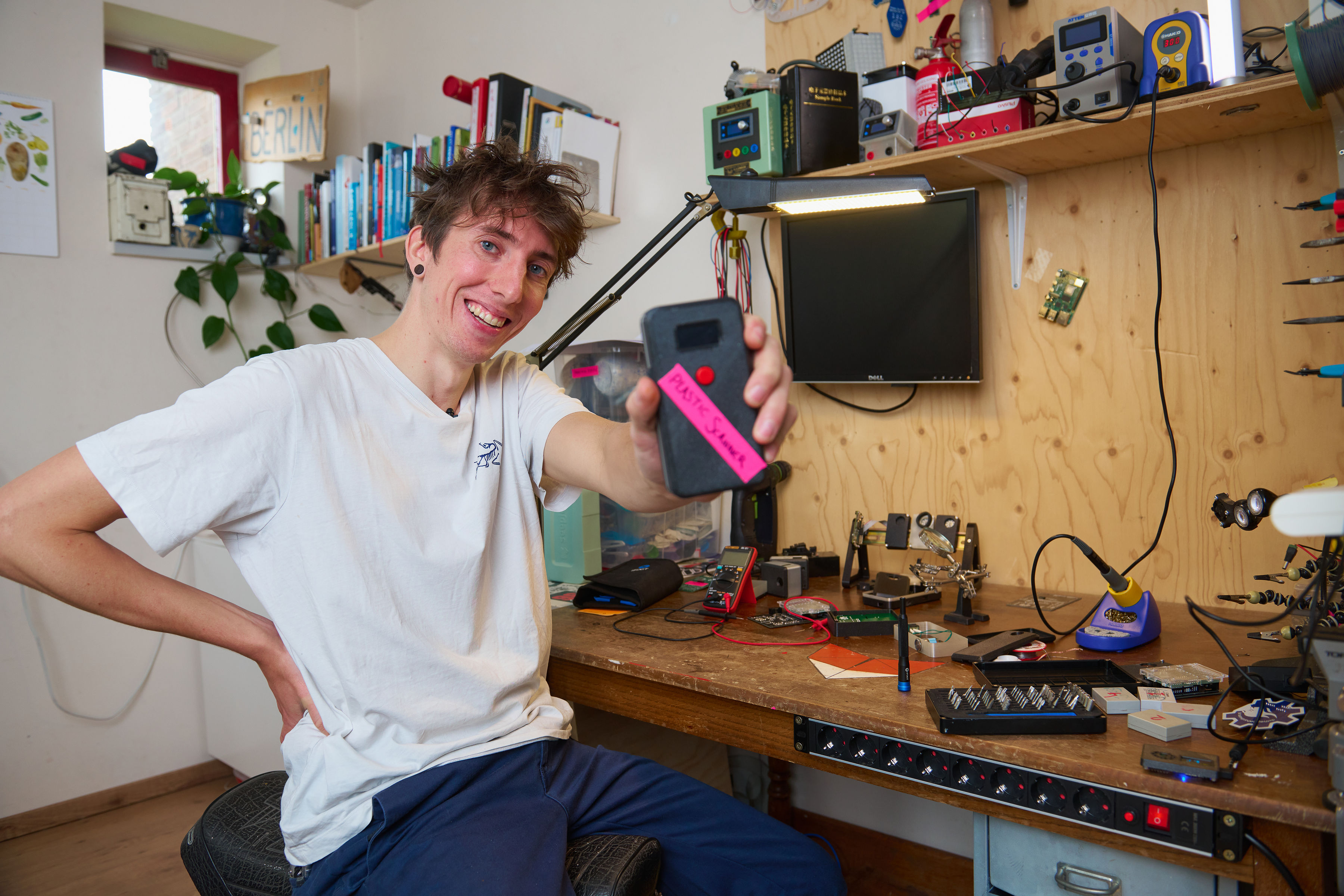Delft Design alumnus Jerry de Vos wins James Dyson Award sustainability prize
With his Plastic Scanner, Jerry de Vos has designed a handheld device that can tell you quickly what kind of plastic something is made of. Knowing this is crucial for better reuse and recycling of the growing worldwide plastic waste. His innovative and creative design showcases what design and technology can do to undertake action on our most pressing sustainability issues. It has landed him the prestigious James Dyson Award 2021 Sustainability Prize.
The problem
Plastic is a lightweight, safe and readily available material which can be used to make long-lasting, durable products. It often not really recyclable and so ends up in landfill, or worse on the beach or in our oceans. However, with the right technologies plastics could be widely recycled successfully at end of life and transformed into new products, which themselves are long-lasting and durable.
The challenge is identifying the plastic so that it can be recycled in the correct way, rather than sent to landfill. The technology exists but is expensive and rare.
The solution
The Plastic Scanner, invented by Integrated Product Design MSc graduate Jerry De Vos the TU Delft Faculty of Industrial Design Engineering, is a handheld device that when held against a plastic composite will tell the user what materials it’s made from, using infrared light to detect the plastic components.
Jerry is a member of Precious Plastic, an organisation that aims to reduce plastic waste. Through his work for the organisation he has witnessed the negative impact of plastic pollution first-hand and the bottlenecks caused when plastic is not identified and sorted in the recycling process. Around the world, much of this process is done by hand which takes time and is prone to error. Jerry has seen successful technology used in large factories in the Netherlands where infrared reflections assist with the sorting. This is a vital step for ensuring it is recycled properly. Jerry’s mission has been to make this technology available for everyone around the world so they can recycle better.
Jerry developed the portable plastic scanner for his MSc thesis project using near-infrared spectroscopy, a technology that can categorize more than 75% of the plastics used in daily life. The device serves as an open source project, whose components can be sourced and manufactured locally. The Plastic Scanner thus helps to correctly separate plastics manually for better quality end products for reuse. Especially important because globally, a lot of waste separation is still done by hand.
The project uses the open source GPL-v3 license, which means that third parties are free to use the project, provided that this right is also passed on to others and the author(s) are mentioned. The Plastic Scanner builds upon Armin Straller's ReReMeter project, by applying the technology in a portable form. This design was the basis for Jerry to eventually make the Plastic Scanner into a tangible product by continually iterating and improving it with, for example, a mini-computer, battery, screen, button and the housing of the final prototype.
Jerry learnt that much plastic entering our oceans comes from low and middle-income countries. It is his mission to support recycling initiatives in these nations with the way he designed the low-cost and ease of use of the Plastic Scanner. During development, Jerry interviewed recyclers from India, Indonesia, Kenya and Curacao to ensure his model was suitable for end users.
Next steps
Now that his design has won the James Dyson Award Sustainability Prize, Jerry has gathered a team of friends specialising in embedded systems and machine learning to support his creation of new prototypes and pilot the Scanner in both industry and low resource contexts. Long-term his goal is to make the project sustain itself, with DIY versions of the Scanner, whilst enriching open-source documentation to make it easier for others to get involved and contribute to his mission: ‘I want the Plastic Scanner to be the simple, open-source device that can identify the most common types of plastic. Winning the James Dyson Award will help accelerate the development process on both the electronics, as well as the software side of the invention. By improving its quality and making it intuitive to replicate, I hope to enable anyone to identify and sort plastic properly, overcoming one of the most complex barriers to plastic recycling around the world.’
Jan-Carel Diehl, Associate Professor Sustainable Product Innovation:
‘The challenge of the design of the Plastic Scanner was to match new advancements in digital technologies with the specific needs and conditions in the informal recycling sector. Or in other words: to make it desirable, efficient, available and cost-effective. Only under these conditions is a Plastic Scanner expected to be used in practice and as such facilitate improved recycling. This has been achieved by an unique combination of human-centered design and technical design considerations like Do-it-Yourself (DIY) kits to enable local production.’

Jan Carel Diehl
- +31 (0)15 27 89729
- J.C.Diehl@tudelft.nl
-
Room B-3-350
"To make design for the unknown known!"
Contact
For press questions, please contact
- Dave Boomkens, Energy Transition science information officer at TU Delft – D.J.Boomkens@tudelft.nl and +31 6 34081461
- Marc de Kool, communications consultant Faculty of Industrial Design Engineering (IDE) at TU Delft – A.J.M.deKool@tudelft.nl and +31 15 27 83723


